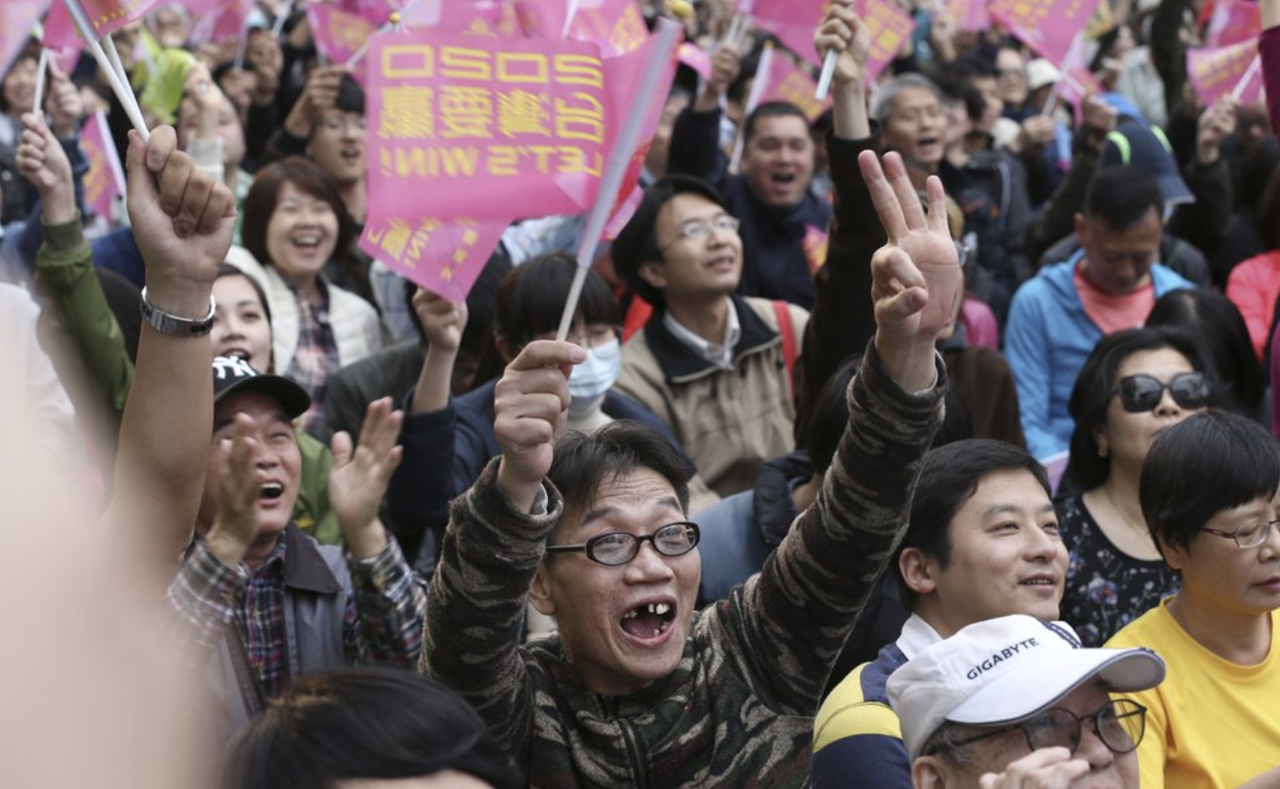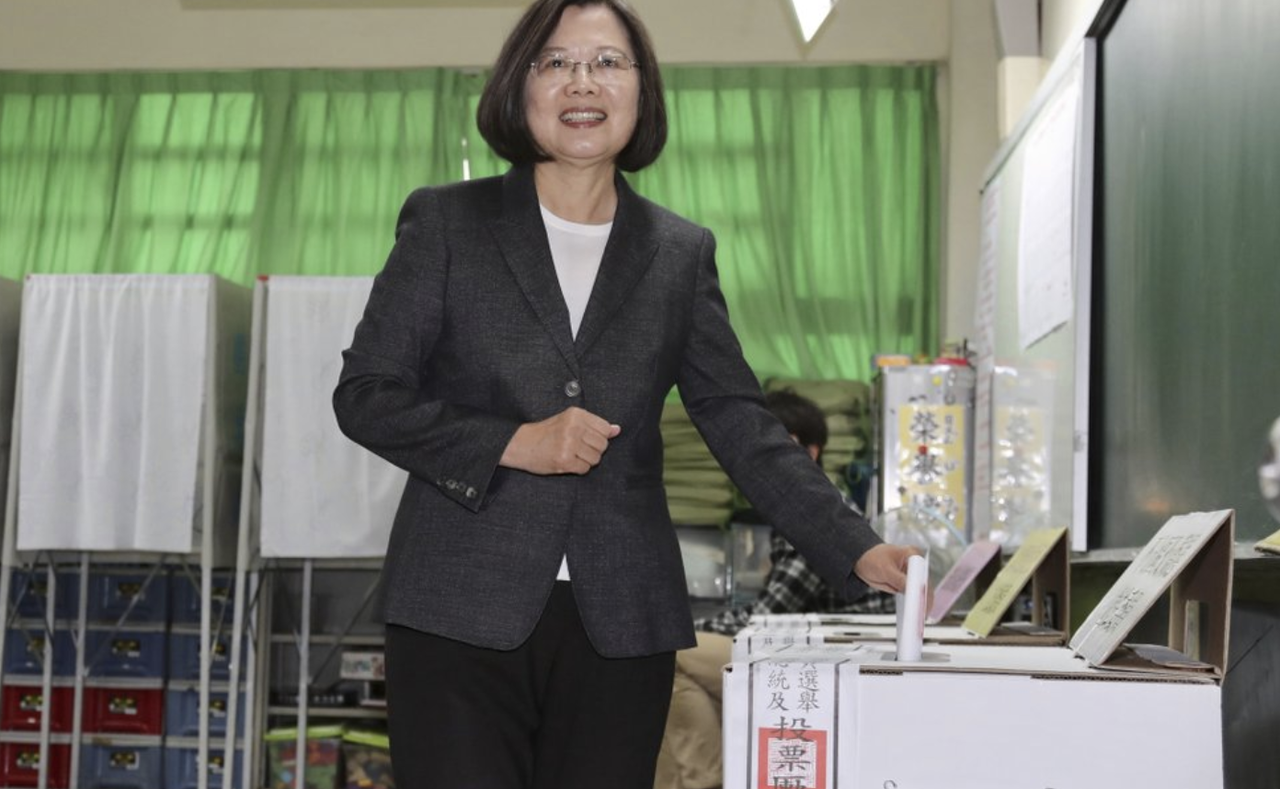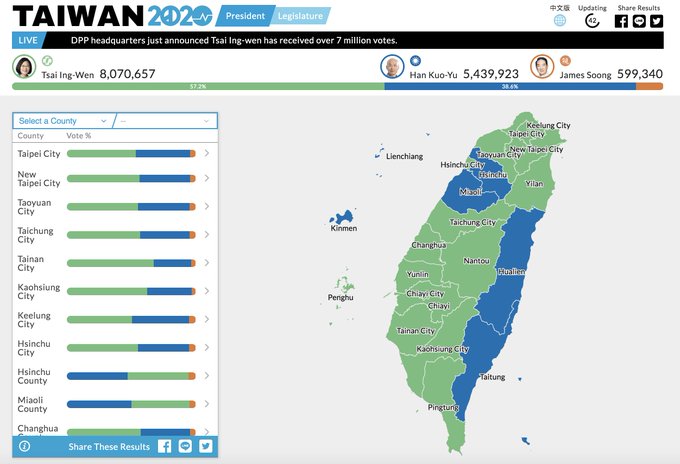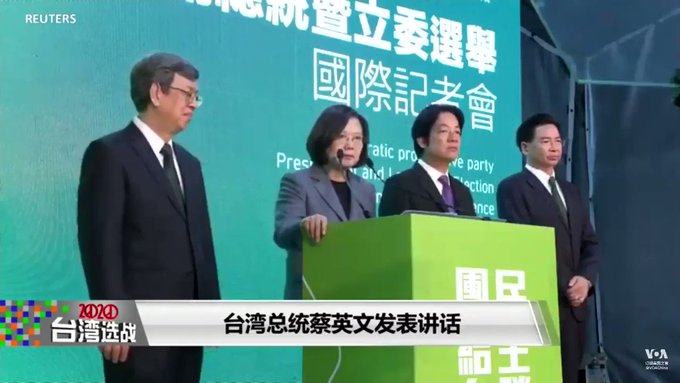In Shocking Rebuke To Beijing, Taiwan's Pro-Independence President Wins Landslide Re-election
All of that paranoia about Beijing's meddling in the Taiwanese federal election was apparently for nought. Because Taiwanese President Tsai Ing-wen has officially secured re-election to a second term in office, sending a clear signal to the mainland that voters have endorsed her confrontational approach to dealing with Beijing.
Tsai caught the world's attention last January when she rebuffed President Xi's remarks about plans to "re-unify" Taiwan and China by insisting that the Taiwanese people would never willingly accept reunification with Beijing. She also insisted that the threat of a Chinese invasion of Taiwan was "growing every day."
Taiwan's president triumphed over two challengers in Saturday’s election: Han Kuo-yu of the rival Kuomintang, the party of Taiwan's founder, Nationalist General Chang Kai Shek, and James Soong of the smaller People First Party, according to final vote tallies seen by the Associated Press.
With nearly all votes counted, Han has reportedly called Tsai to concede.
Han, the KMT candidate, was said to run a "Trump-like" campaign seeking to capitalize on populist anger.
By winning reelection, Tsai as dealt a serious blow to the Kuomintang, which had ruled over Taiwan for most of its history as a quasi-nation independent of the mainland. Han, the KMT candidate, had pushed for friendlier ties with Beijing.
President Tsai casting her vote
President Xi and his fellow Communist leaders have taken an especially hard line against Tsai since her 2016 inauguration. Her refusal to endorse China's claim that Taiwan is merely a renegade province have infuriated them, prompting Xi to suggest that the mainland could coerce Taiwan's reunification by force if necessary.
Though, to be sure, the US has a treaty with Taiwan promising aid should such an invasion occur. Beijing has warned foreign powers that if they interfere in its relationship with Taiwan, they, too, will face Beijing's wrath.
Tsai didn't just win the election - by taking home nearly 58% of the vote, she waxed both of her opponents in a "landslide" victory.
Big win for President @iingwen & DPP in #Taiwan #elections - interactive election results: international.thenewslens.com/interactive/12…
It's the latest rebuke to Beijing during a period when Hong Kong, the formerly British colony that's now a Special Autonomous Region of the PRC, is still being rocked by pro-democracy street protests. If anything, the results of Taiwan's election will encourage the protesters to reach out to others who believe they're being oppressed by the Communist leaders in Beijing.
The outcome for Tsai's Party in Taiwan's Legislative Yuan is also critical for Tsai, who could find herself hamstrung by the opposition if her DPP doesn't win enough support. There are 113 seats in the Legislative Yuan, of which 73 will be filled by winners in their districts, while another 34 are awarded proportionately to "at-large" candidates put forward by each part. Another six seats are reserved for indigenous candidates, according to the Washington Post.
Fortunately, initial results suggest her party will retain its majority.
Another big win for Taiwan’s Tsai Ing-wen: the DPP appears to be on track to retain its majority in the Legislative Yuan. #TaiwanElection #Taiwan2020
The last round of polls before the vote showed Tsai with a commanding lead, with some showed her winning by as much as a 30 percentage-point margin. More than 19 million people were eligible to vote on Saturday, including 1.2 million 20 to 23-year-olds who were eligible to vote for the first time.
Natasha Kassam, an Australian diplomat who's now with the Lowy Institute in Sydney, told WaPo that Taiwan’s vote could be the most consequential election of 2020.
"Not only is Taiwan a proxy for much of the world’s strategy to deal with the consequences of an increasingly authoritarian China, but also Taiwan has been on the front lines of the Chinese Communist Party’s aggression for decades," she said. "And while it is trying to safeguard its democratic institutions, it’s also trying to manage its economic relations with China."
Since Han asked his supporters not to cooperate with pollsters, uncertainty surrounding the polls led to frenzied get-out-the-vote effort by all parties. Local media featured footage of long lines of people waiting, including one where Tsai’s predecessor as president, Ma Ying-jeou, waited for 30 minutes. And since there's no absentee voting in Taiwan, Taiwanese living abroad returned in droves to cast their ballots.








No comments:
Post a Comment
Comments always welcome!